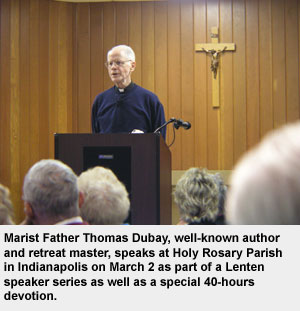Marist Father Thomas Dubay discusses
process of deep conversion
By Brandon A. Evans
 The first words of Jesus Christ that are recorded in his public ministry admonish us to convert and accept the Gospel.
The first words of Jesus Christ that are recorded in his public ministry admonish us to convert and accept the Gospel.
Deep conversion was the topic of a presentation by Marist Father Thomas Dubay, a well-known author, university teacher and retreat master, on March 2 at Holy Rosary Parish in Indianapolis.
The program was part of the parish’s five-part, weekly Lenten speaker series.
Jesus’ command, Father Dubay said, at one time seemed to him to be backward—conversion follows the acceptance of the Gospel. But what the Lord is saying is to convert from our current way of living to a way that appreciates truth, goodness and beauty.
“Once a person is deeply converted and hears the Gospel,” he said, “that person will love the Gospel because there’s nothing nearly as beautiful on our planet.”
It is egocentrism that we are converting from, Father Dubay said, which is the result of original and actual sin that causes us to be constantly concerned with our own wants and desires.
But conversion requires more, he said. It requires a turning away from idols and a total worship of God, who is the source of all truth, goodness and beauty.
“You’re going to worship something, you’re going to kneel to something,” he said. “If it’s not the real God, it’ll be something created [and] finite.”
He said some people worship their sense of pride or lust or wealth.
“The Lord put it perfectly,” Father Dubay said. “You cannot serve God and mammon. Now there are people who strive to do that—straddle the fence, have them both—but he says it’s impossible. Of course it is.”
Father Dubay also quoted Cardinal John Henry Newman, who said that most people live and act not according to the evidence or the truth, but according to their preferences.
Generally, Father Dubay said, this appears to be more and more true.
“When it’s a question of religion, morality, politics and lifestyle, people go according to what they prefer,” he said.
Some people make those preferences into their own idols, into their own “consuming concern,” he said. Their idolatry becomes a mortal sin, and people risk hell to keep their idols.
Thus, he said, the first step in deep conversion is to give up mortal sin—those things that keep us from loving God and neighbor.
The second step is to give up the lesser venial sins—things like gossiping and overeating.
The irony is that many people don’t take this step, Father Dubay said.
He told a story about St. Bernard who, as a young abbot, was addressing his monks.
“There are more people converted from mortal sin than there are religious converted from good to better,” St. Bernard said.
Though he was addressing the monks, what he said applies to all people—lay, religious and ordained—who each have a call to holiness, Father Dubay said.
“What is shocking is, you would think that people who love God … would avoid offending him in even small matters,” Father Dubay said. But yet we all do, and we act the same with the people we love.
The last step in deep conversion is the hardest—to live like the saints, to live out heroic virtue.
Father Dubay said that Scripture is rife with passages that call on us to be perfect, pure and holy.
“A saint doesn’t stop with giving a lot,” he said. “They give everything because they’re head over heels in love.”
Some of the hallmarks of truly holy people, he said, are that they act promptly, are joyful in hardships, possess all virtues and are habitually holy.
“The saints put no limits on loving and showing it. They light fires,” he said. “Saints, therefore, are the most splendid men and women on earth. They’re icons of human beauty.”
If we are all God’s works of art, as St. Paul says in Ephesians, then the saints are the masterpieces, Father Dubay said.
He continued his presentations on deep conversion the following two nights at the parish as part of a 40-hours devotion, which included prayers and continual adoration of the Blessed Sacrament.
Striving deeply to convert to a saintly way of life is the most significant thing a person can do, Father Dubay said.
“It’s more important than anything else you have to do. And that’s not simply my opinion,” he said. “It’s God’s word and it’s common sense. What kind of eternity you will have is incomparably more important” than anything else on earth. †
 The first words of Jesus Christ that are recorded in his public ministry admonish us to convert and accept the Gospel.
The first words of Jesus Christ that are recorded in his public ministry admonish us to convert and accept the Gospel.